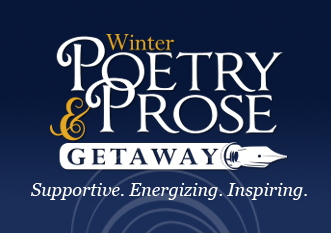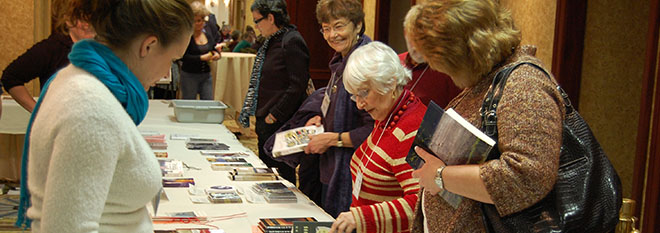Murphy Writing of Stockton University Presents

This entry is part of Getaway Reads, an e-mail series curated by Marissa Luca that features the writing of the Winter Poetry & Prose Getaway faculty.
1
from Devil on My Heels
by Joyce McDonald
Lately I have taken to reading poems to dead boys in the Benevolence Baptist Cemetery. They don’t walk away before I have finished the first sentence, like most of the live boys I know. When I read to them, their eyes don’t wander to something, or someone, more interesting. I can pretend these boys are listening. I can pretend they hear me.
On Friday afternoons like this one, right after seventh period, I head straight for the cemetery. I like to sit beneath the Austrian pines in the cool shade, reading lines from Tennyson or Wordsworth, listening to the whisper of the wind through the branches–listening to the trees making up their own poems. Soft words in the language of wind and pine needles.
Miss Delpheena Poyer, my English teacher, is the reason I am sitting in the Baptist cemetery reading poems to dead boys. This marking period we are studying poetry. All kinds of poetry. A few weeks back Miss Poyer sent us on a mission to find interesting epitaphs on gravestones. That was our homework assignment. I went to three church cemeteries in Benevolence looking for verses. My favorite epitaph is engraved on the headstone of Rowena Mae Cunningham, who died in 1871, wife of Cyril Cunningham.
here lies rowena mae
my wife for 37 years.
and this is the first damn thing
she ever done to oblige me.
I think that says all that needs to be said about the Cunninghams’ marriage.
This afternoon I am reading to Charles Henry Colewater, “Beloved son of Emily and Carter Colewater,” who died at the age of fourteen in 1903. He was only a year younger than I am now. His parents’ graves are to the right of his. Sometimes I have this eerie feeling their spirits are hovering over my shoulder, making sure I don’t read anything they’d disapprove of. This is, after all, a Baptist cemetery.
I lean my shoulder against Charles Henry’s headstone. If I close my eyes, I can imagine I see his face, a friendly face dotted with light freckles across his nose and cheeks, like little muddy footprints left behind by ants.
My mom’s grave is only a few yards from Charles Henry’s. All it says on her headstone is Caroline Winfield Alderman, 1922-1947, wife of Lucas Alderman. It doesn’t say a word about her being mother to Dove Alderman. I was barely four years old when she left this earth, so I don’t remember her very well. But it makes me a little sad that nobody took the time to write an epitaph for her.
This week in Miss Poyer’s class we are studying sonnets. I flip through the Selected Poems of John Keats, pick out one of his sonnets, and start right in reading it to Charles Henry. Only, the first line stops me cold: “When I have fears that I may cease to be.” I know those fears Keats is talking about. Sometimes I lie awake half the night, worrying that Mr. Khrushchev and those Soviets might decide to drop an atom bomb right smack-dab in the middle of Florida before I know what a real kiss feels like. Not those slobbery head-on collisions after the bottle stops spinning, with everybody looking on. I mean the real thing. Although I’m a little vague on what that might be.
Not that I haven’t been kissed a few times. I have. Even been French kissed by Bobby McNeill in eighth grade at Donna Redfern’s party when we were dancing and somebody turned the lights out. I was expecting a plain old spin-the-bottle kiss. The next thing I knew, I thought I had a raw oyster stuck in my mouth.
I am absolutely positive that kissing gets better than this. Otherwise I would lie down right here next to Charles Henry and pull the sod up over my head.
I rest my shoulder against the chiseled curve of his tombstone. Poor Charles Henry. He was so young when he died. This is why I read poems–love poems mostly–to boys like him, boys who most likely passed on before they ever had a chance to fall in love. If I were in their shoes, I would certainly be most appreciative of any visitors stopping by my final resting place to read a poem to me now and then.
A wind suddenly kicks up its heels and tears the pages from my hand as I’m flipping through Selected Poems, trying to find something a little more cheerful to read to Charles Henry. It sets the Spanish moss into frenzied flapping over head in the trees. A storm is coming. They have a way of springing up unannounced on steamy afternoons in Florida.
A loud crash of thunder rumbles through the trees, sending me to my feet. Dark clouds tumble all over each other. I smell the rain in the air, a chilled metallic smell, even sense it on my skin. But I can’t see it. It is as if the rain is stuck in some kind of purgatory between the earth and the sky.
The Austrian pines have stopped their whispering and are beginning to moan–loud eerie moans that burrow into my bones. The first bolt of lightning makes a beeline for the woods behind the church.
The sky turns the color of lead. Everything around me blurs into tones of gray, except for a large splotch of red in the distance. The red splotch zips along a few feet above the earth, picking up speed. A flash of lightning outlines everything in sharp blinding white. I recognize that faded red T-shirt and the person wearing it. I watch him stop to fold something and stuff it into his back pocket. Then he takes off running through the cemetery toward the road.
I don’t move from my place beside Charles Henry. When the blob of red is only a few yards from me, it stops. We stare at each other. The wind blows sand in my eyes, making them tear.
“Gator?” I shout above the roar. This is what goes through my mind faster than the next bolt of lightning can streak to the ground: Why aren’t you in the groves picking oranges? Travis Waite is going to fire your hide for sure if he hasn’t already. And what, for heaven’s sake, are you doing in a cemetery that’s for white folks in the middle of the afternoon with lightning bolts looking for any moving target in sight?
I shout his name again, but Gator doesn’t answer. The wind beats at his red T-shirt as if it is trying to tear it right off his body.
The thunder seeps into the soles of my penny loafers. It rumbles through my body. I pick up my books, tuck them close to my chest, and keep my head down. I have to find someplace to get away from the storm. I head across the cemetery, walking as fast as I can in a pencil-straight skirt with nothing but a tiny kick pleat for maneuvering.
By now the wind has whipped itself into a frenzy. Flying sand stings my legs. A streak of lightning zigzags into the meadow across the street. When I look back, the red shirt is gone. Gator has disappeared.
This is what I am puzzling over, in between rumbles of thunder, when I hear another sound: the piercing honk of a car horn. I look up to see Chase Tully, grinning at me from his silver-blue T-bird convertible.
© Joyce McDonald. Published in Devil on My Heels, published by Laurel Leaf, 2005.
+ + + + + + + + + +
Joyce McDonald is the author of eight books, among them Swallowing Stones, an ALA Top Ten Best Book for Young Adults, and Shades of Simon Gray, an Edgar Allan Poe Award nominee. Her latest novel is Devil on My Heels (Delacorte). Her books have been nominated for numerous state awards and are on several state reading lists. She has taught literature and creative writing at Drew University and East Stroudsburg University, and was on the faculty of Spalding University’s brief-residency MFA in Writing Program for several years. Learn more about Joyce and her work from her website joycemcdonald.net.
+ + + + + + + + + +
Want to study with Joyce McDonald? At the 2018 Winter Poetry & Prose Getaway, Joyce will be leading Beginning Your Novel.
+ + + + + + + + + +
Our Participants Say It Best
“The workshops were supportive and so much fun. I am thrilled with the work I began at the Getaway. My writing and my commitment have been re-energized and I can’t wait to continue writing. The hotel was a delight—the staff was so helpful and the facility was beautiful.”
~ Linda, Cedar Grove, NJ
Our Philosophy
Escape the distractions of your busy life. Advance your craft and energize your writing with a challenging and supportive Writing Getaway. Join us at one of our upcoming writing retreats and take advantage of plentiful writing time, insightful feedback, good meals and good company. Get Away to Write.




